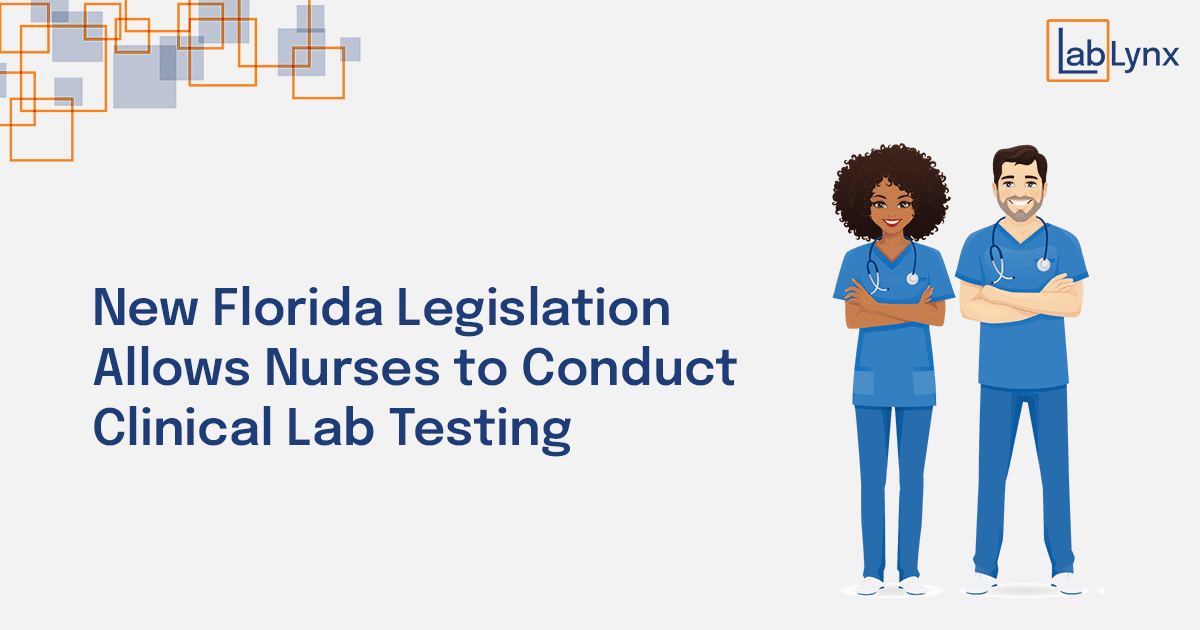
By: Chris Casper | LabLynx, Inc.
Registered nurses’ roles in Florida’s hospital laboratories will change on July 1. Previously, the state’s regulations did not let RNs perform clinical testing at some hospital laboratories without additional licenses. New legislation will let qualified RNs perform low-to-moderate complexity testing without that extra burden.
These changes have sparked conversations about what it means for nurses and clinical laboratories in Florida and around the country. To help the community understand the potential impact, we will explain what drove the legislation and translate its legalese into plain English.
Why was this change needed?
Florida Senator Ana Maria Rodriguez introduced Senate Bill 1734 – Clinical Laboratory Testing (SB 1734) in late 2021. Testifying before the Florida Senate Committee on Health Policy, Senator Rodriguez explained:
“There are simply not enough available clinical lab technicians — on a permanent or temporary basis — available to conduct the necessary lab testing… we would like to help address that shortage….”
Staffing challenges at clinical laboratories
 Florida’s situation is not unique — or new. Clinical laboratories across the country face staffing challenges. Those challenges have been building long before the COVID-19 pandemic. Over the past few decades, the decline in laboratory technology academic programs has constrained the workforce pipeline. According to the American Society for Clinical Laboratory Science (ASCLS), only 5,000 medical laboratory professionals graduate every year into a sector that needs 12,000 new employees annually.
Florida’s situation is not unique — or new. Clinical laboratories across the country face staffing challenges. Those challenges have been building long before the COVID-19 pandemic. Over the past few decades, the decline in laboratory technology academic programs has constrained the workforce pipeline. According to the American Society for Clinical Laboratory Science (ASCLS), only 5,000 medical laboratory professionals graduate every year into a sector that needs 12,000 new employees annually.
In its position paper on the issue, the ASCLS identified several trends impacting laboratory staffing:
- Looming Retirements – Older lab employees are retiring at a faster rate. Almost 20 percent of respondents to a 2017 survey planned to retire within 5 years.
- Growing Demand – Personalized medicine and other healthcare trends accelerate the demand for testing driven by an aging population.
- Skills Shortages – Molecular testing and other technologies require skills that are underrepresented in the current workforce.
These issues have intensified since the COVID-19 pandemic pushed the nation’s healthcare system to its limits. Morning Consult estimates that nearly one-third of healthcare workers have lost their jobs or quit since 2020. Of the remaining employees, nearly 20 percent have considered leaving the field.
Hospital laboratories are just as vulnerable to this trend. Last year, the American College of Healthcare Executives surveyed hospital CEOs. Keeping laboratories staffed was a top concern for 85 percent of respondents. Mercer’s financial analysts forecast a nationwide shortage of 98,700 clinical technologists and technicians by 2025. Florida’s share of this shortage could exceed 3,000.
How Florida’s nurses support hospital laboratories
Hospitals in Florida have some flexibility when it comes to keeping their laboratories staffed. As Senator Rodriguez explained to the Florida Senate Appropriations Committee:
“Currently hospitals may allow RNs to conduct the necessary moderate-complexity testing in hospitals outside of the main laboratory.”
However, there is a catch. Senator Rodriguez outlined how Florida’s clinical laboratory regulations treat hospital labs in different ways:
“Hospitals are prohibited from authorizing RNs to conduct the testing in an off-site hospital emergency department also known as free-standing emergency rooms. At the present time, only lab technicians are eligible to perform these tests in these offsite emergency departments.”
SB 1734 would remove that distinction. Let’s take a look at how it works.
Walking through SB 1734
Senate Bill 1734 – Clinical Laboratory Testing
1
2 An act relating to clinical laboratory testing;
3 amending s. 483.801, F.S.; exempting registered nurses
4 from clinical laboratory personnel licensure
5 requirements under certain circumstances; providing an
6 effective date.
7
8 Be It Enacted by the Legislature of the State of Florida:
9
10 Section 1. Subsection (7) is added to section 483.801,
11 Florida Statutes, to read:
12 483.801 Exemptions.—This part applies to all clinical
13 laboratories and clinical laboratory personnel within this
14 state, except:
15 (7) Registered nurses licensed under chapter 464 who are
16 determined by the clinical laboratory director of a hospital or
17 hospital-based off-campus emergency department licensed under
18 chapter 395 to be qualified under 42 C.F.R. s. 493.1423 to
19 perform only moderate-level or waiver-level clinical laboratory
20 testing in accordance with s. 395.0091 within the hospital or
21 hospital-based off-campus emergency department with a separate
22 federal Clinical Laboratory Improvement Amendments (CLIA)
23 program clinical laboratory certification under 42 C.F.R. part
24 493.
25 Section 2. This act shall take effect July 1, 2022.
Florida Statute Title XXXII, Chapter 483, Part I regulates clinical laboratory personnel and establishes Florida’s Board of Clinical Laboratory Personnel. In turn, the Board sets licensing requirements for any director, supervisor, technologist or technician working in a clinical laboratory.
However, this rule carves out six exemptions from the licensing requirements. For example, unlicensed staff may perform clinical tests at laboratories that are wholly-owned by practitioners licensed in:
- Medical practice
- Osteopathic medicine
- Chiropractic medicine
- Podiatric medicine
- Naturopathy
- Optometry
- Dentistry
Those tests may only be performed for the practitioners’ own patients. Practitioner-owned labs that accept outside business must employ licensed staff. Chapter 483 also has a specific exemption for RNs working at those practices that lets them conduct provider-performed microscopy procedures.
SB 1734 adds a seventh exemption to the list. Directors of hospital clinical laboratories may, at their discretion, let RNs with proper qualifications perform waiver-level or moderate-level clinical testing. When this rule goes into effect on July 1, it will apply to any facility operated by a hospital clinical laboratory — including off-site hospital emergency departments.
As SB 1734’s made its way through committee, it was amended several times to keep Florida’s regulations aligned with federal standards set by the Clinical Laboratory Improvement Amendments (CLIA). Hospital lab directors can only use their new privilege as long as their lab remains CLIA-certified and the RNs they employ meet CLIA’s requirements for education and training.
How does CLIA regulate clinical testing?
Enacted in 1988, the Clinical Laboratory Improvement Amendments regulate clinical laboratories nationwide. Congress wanted to improve healthcare quality by creating consistent rules for labs performing clinical testing. CLIA ensures the competence of clinical labs and their employees. One way of doing this is by three categories of test complexity:
- Waived
- Moderate-complexity
- High-complexity
Waived tests are relatively simple to perform and interpret with low risks of false results. Test manufacturers must apply to the FDA for waived status. Otherwise, the FDA evaluates tests on seven criteria:
- Knowledge – How much scientific or technical knowledge should the employee have?
- Training and experience – How specialized does the employee’s training need to be?
- Reagents and material preparation – Are special handling procedures required?
- Operational steps – Can the test be automated or easily controlled?
- Calibration, quality control and proficiency testing – Are all materials stable and readily available?
- Test system troubleshooting and maintenance – How much intervention is needed by employees?
- Interpretation and judgment – How dependent are the test results on an employee’s judgment?
After combining the scores for these criteria, the FDA classifies a clinical test as either moderate-complexity or high-complexity. Clinical laboratories receive CLIA certifications based on the tests that they — and their employees — are qualified to handle. Under CFR 42 Part 493, for example, testing personnel may only perform moderate-complexity tests if they are
- Licensed by their state, and
- Meet one of these qualifications:
- Have an undergraduate or higher degree in certain medical or scientific disciplines.
- Have an associate degree in certain medical or scientific disciplines.
- Have a high school diploma or equivalent and served as a Medical Laboratory Specialist in the US armed forces.
- Have a high school diploma or equivalent and documented training for a specific test.
In effect, SB 1734 recognizes that RNs had to meet the same or better qualifications to receive their registered nurse license from Florida’s Board of Nursing.
How will SB 1734 impact Florida?
This amendment to Florida’s laboratory regulations has a very narrow scope. Only CLIA-certified hospital clinical laboratories get the exemption. Labs that operate independently or within a non-hospital organization may not hire RNs without a clinical testing license to perform waived or moderate-complexity testing.
Even then, the impact will vary from hospital to hospital depending on each location’s staffing situation. At labs struggling to fill technician openings, the new rule gives directors more flexibility by expanding the pool of RNs allowed to perform tests.
Whether that flexibility will make a difference is an open question. As with the rest of the nation, Florida is struggling with a nursing shortage. Although the ACHE’s survey found that the lack of laboratory technicians is among hospital CEOs’ top concerns, they are most worried about the shortage of nurses.
A survey conducted by the Safety Net Hospital Alliance of Florida and the Florida Hospital Association found that the state’s 5% shortfall in RNs in 2019 would grow to 12% by 2035. Given the timing, this survey did not account for the pandemic’s impact. Declining morale and shifts in the nursing workforce could make the shortage worse.
Will SB 1734 have an impact beyond Florida?
Just as SB 1734’s impact within Florida will be case-by-case, the rule’s impact in the rest of the country will be state-specific. Similar legislation would only be needed in states where:
- Clinical laboratory regulations fail to address hospital labs with multiple locations,
- Licensing rules do not recognize the qualifications of RNs, and
- Lab staffing shortages outweigh nurse staffing shortages.
Clinical labs everywhere are dealing with long-term trends in the healthcare workforce, the pandemic’s additional impact and the exploding demand for clinical testing. No silver bullet will put the staffing shortage to rest. Yet, SB 1734 is a small, focused innovation that may make a difference in certain hospitals.
Giving hospital laboratory directors more flexibility when staffing their labs is a good thing. So is letting highly-qualified registered nurses perform clinical tests without forcing them to get another license.
In combination with other innovations in laboratory practice, SB 1734 may help Florida’s hospital laboratories weather the storm and set examples for labs across the country.
















